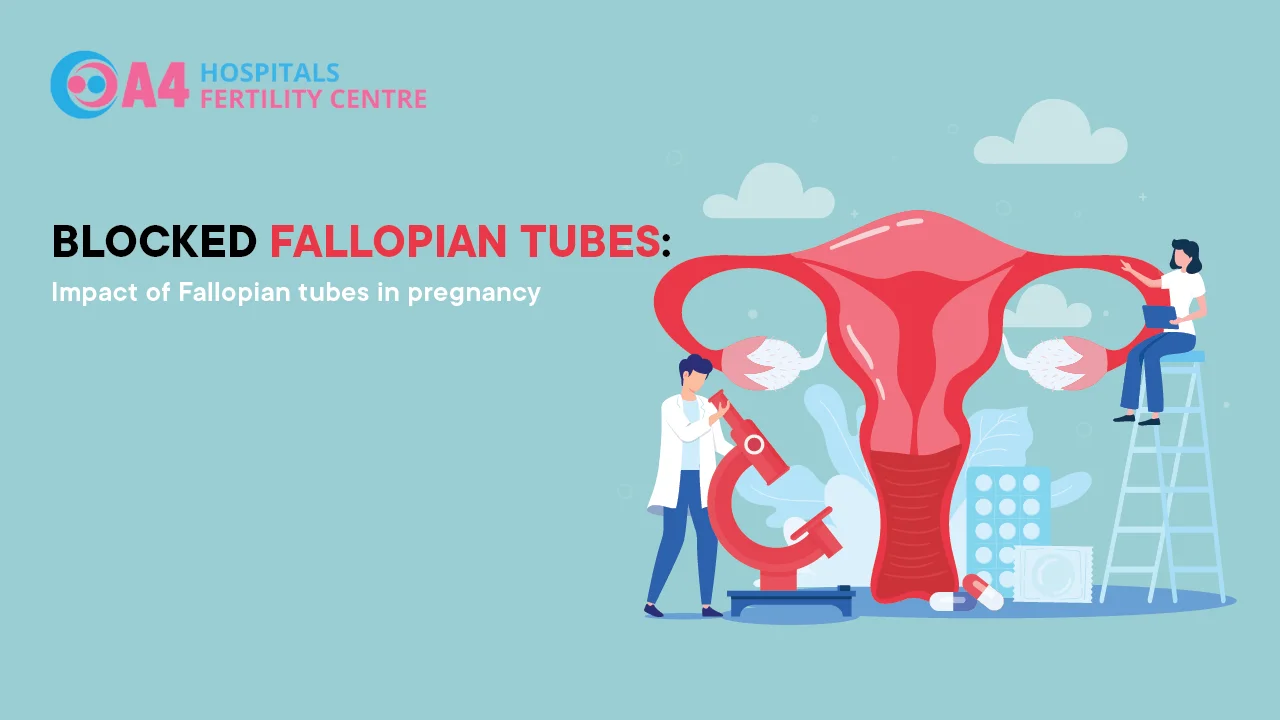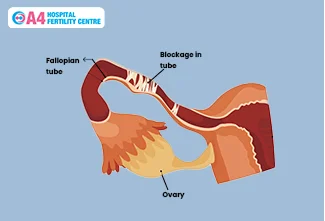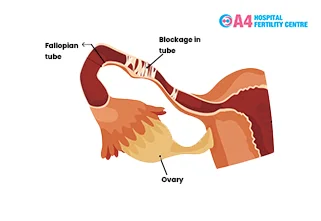
Dr. Aruna Ashok MBBS, MS OG, DNB OG
- Clinical Director

This comprehensive guide describes the impact of blocked fallopian tubes on pregnancy. The fallopian tubes play a crucial role in the reproductive process, serving as the pathway for the egg to travel from the ovaries to the uterus. However, when these tubes become blocked or obstructed, it can lead to fertility challenges and hinder natural conception. Understanding the implications of blocked fallopian tubes is vital for individuals hoping to start or expand their families. The importance of the fallopian tubes is like the foundation of a house - if it's weak, the rest of the structure will not be able to properly support itself. Unless the underlying issues are addressed, the entire process will be compromised and the desired outcome can never be achieved.


In this article, we will explore the definition of blocked fallopian tubes, examine the various causes that can lead to this condition, and discuss the available treatment options. It is important to gain insight into the causes of blocked fallopian tubes to identify the most appropriate treatment approach. By understanding the impact of this condition, individuals can make informed decisions about their reproductive health and seek the necessary support.
By increasing our knowledge about this condition, we can empower ourselves to navigate the journey towards parenthood more effectively. But don't forget that it's also important to enjoy the ride!
Blocked fallopian tubes, also known as tubal factor infertility, refer to the obstruction or blockage of one or both fallopian tubes. These tubes serve as a crucial passage for the egg to meet with sperm and for the fertilized egg to travel to the uterus for implantation. When the fallopian tubes are blocked, it becomes challenging for the egg and sperm to meet, hindering natural conception.
Several factors can lead to the development of blocked fallopian tubes. It's important to identify the underlying causes to determine the most appropriate treatment options. Here are some common causes:
PID is an infection that typically arises from sexually transmitted infections (STIs), such as chlamydia or gonorrhea. If left untreated, PID can cause inflammation and scarring in the fallopian tubes, leading to blockages.
Endometriosis is a condition where the tissue lining the uterus grows outside of the uterus. When this tissue implants on or around the fallopian tubes, it can cause scarring and blockages.
Any previous pelvic surgery, such as a cesarean section or surgery to treat ovarian cysts, can result in adhesions or scar tissue formation that may obstruct the fallopian tubes.
Adhesions are bands of scar tissue that can develop within the pelvis due to inflammation, infection, or previous surgeries. These adhesions can block or distort the fallopian tubes, preventing the eggs from reaching the uterus.
An ectopic pregnancy occurs when a fertilized egg implants outside of the uterus, usually in the fallopian tube. The resulting damage and scarring can cause blockages in the affected tube.
The treatment for blocked fallopian tubes depends on various factors, including the severity of the blockage, the presence of any other fertility issues, and a woman's desire for pregnancy. Here are the main treatment options available:
In cases where the blockage is caused by an infection, such as PID, antibiotics can be prescribed to treat the underlying infection and reduce inflammation. This approach is most effective for mild cases.
Tubal Surgery : If the blockage is due to adhesions or scar tissue, laparoscopic surgery can be performed to remove or repair the damaged portion of the fallopian tube. This procedure aims to restore the normal function of the tubes.
In Vitro Fertilization (IVF) : IVF is a highly successful fertility treatment that bypasses the fallopian tubes altogether. It involves retrieving eggs from the ovaries, fertilizing them with sperm in a laboratory, and transferring the resulting embryos directly into the uterus.
Intrauterine Insemination (IUI) : In cases where the fallopian tubes are partially blocked or if there are mild adhesions, IUI can be performed. This procedure involves placing specially prepared sperm directly into the uterus during the woman's ovulation period.
Gamete Intrafallopian Transfer (GIFT) : GIFT involves the transfer of both eggs and sperm into the fallopian tubes, allowing natural fertilization to occur within the woman's body. This procedure is less commonly used than IVF and IUI.
In cases where the fallopian tubes are severely damaged or completely blocked, and pregnancy is not possible, alternative options such as using donor eggs or opting for surrogacy can be considered.
Blocked fallopian tubes can significantly impact a woman's ability to conceive naturally. Understanding the causes and available treatment options is crucial for individuals struggling with this condition. Seeking professional guidance and discussing the available treatment approaches with a fertility specialist is recommended. At our fertility center, we offer comprehensive evaluations and personalized treatment plans to address blocked fallopian tubes. With the appropriate treatment approach, couples can enhance their chances of achieving pregnancy and fulfill their dreams of starting a family. This is like providing a roadmap to a destination, where the individual can follow the prescribed paths that are laid out to reach the desired destination and create a successful outcome.